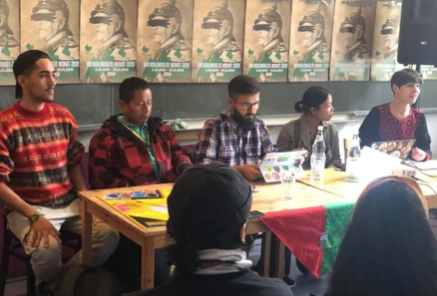[Berlin, 09 October 2019] A two-day forum on 5-6 October composed of panel discussions and workshops tackling political and social issues such as imperialism and neo-colonialism, racism, territorial and natural resources defense, anti-patriarchal struggles, and internationalism marked the opening of the first Anticolonial Month (5 Oct- 15 Nov) in Berlin. The forum which gathered together more than 200 participants from Berlin and elsewhere is designed as a venue not only to discuss and consume information but an open space to acquire a deeper understanding of each other’s struggles and strategies in order to forge a strong unity to mutually advance all struggles.
Zara Alvarez of Negros Island Health Integrated Program for Community Development Inc., along with Abel from the National Indigenous Association of Colombia, and Ferhat from the Kurdish Student Federation were the invited speakers in the Panel “Defending Our Territories and Natural Resources: Strategies and Practices of Resistance in the Global South”. The three shared and illustrated their particular conditions and peoples’ resistance against the control of their lands and rivers by aggressive imperialist powers through their local ruling elites.
Zara is actively involved in campaigns against the construction of a Mega Shipyard that will displace hundreds of poor families in the coastal area of Negros, of the continuing operations and applications of foreign mining companies exacerbated by the foreign serving Philippine Mining Act of 1995, as well as in strengthening the collective actions of farmers in occupying idle landlord lands thru “Bungkalan”. She expressed her increasing alarm as the peoples’ resistance are being met by heightened Duterte government’s sponsored killings and harassments thru the Oplan Sauron, where 87 deaths have been recorded in the last three years since Duterte came to power. As a conclusion she thanked the people in Anticolonial Berlin and all those who are present in creating spaces to listen to their plight and struggles and to be in solidarity with them.
Abel belongs to an Indigenous Group in Colombia, and was part of the Asturias program in Spain for temporary protection. The Program enabled him to travel to Germany and speak in the panel. The Program is now over and he has to go back to Colombia despite the imminent threat to his life. He discussed with fervor their century old suffering from colonial power, the betrayal of their own ruling government and their- the indigenous peoples enduring fight for their rights, lands and territories. Their groups’ symbol of struggle is an Indigenous Guard with a wooden spear, denoting their principle to non- violent means of resistance. He noted however that the increasingly brutal and repressive state reactions against their non-violent defiance is pushing them to even consider taking up arms. He ended with a call for support to their struggle, not for him but for the generations to come and expression of his peoples’ staunch oath to defend their mother earth, as good sons and daughters would do.
Ferhat talked about the threat of a mega dam that will not only displace hundreds of families but could wipe out a thousands of years old world historical heritage, the birthplace of the oldest civilization discovered so far that emerged from the fertile lands of the rivers Euphrates and Tigris. The resistance of the Kurdish people, who highly value not only the rights of the affected peoples in the proposed dam but also the historic significance of this heritage have been met with repression from the Turkish government, the main sponsor for the construction.
The panel concluded with discussions revolving around how imperialist powers and their hands thru repressive local regimes have its deep historical colonial roots and that it continues and increasingly becoming more aggressive in the face of ever worsening crisis of the monopoly capitalist system, wanton destruction of natural resources that results to the climate crisis, and the growing resistance of the peoples in different parts of the globe.
The Anticolonial month is organized to actively claim the space and platform to speak for ourselves, the exploited and the oppressed, particularly the conditions in our home countries and how they are connected to the politics and economics of our residence country, Germany and to engage in defining solutions that are just and humane. Different activities organized by the anticolonial Berlin and other independent organizations are spread out in different days within the duration of the Anticolonial Month.
The idea is initiated by the Bloque Latino Americano Berlin, a progressive internationalist network of individuals and social and political organisations coming from different countries in South America. It is then taken up as a collaborative work by various organisations and network based in Berlin including Gabriela Germany, Migrante Europe, Africa United Sports Club, Unidos por la Paz-Alemania, Ni Una Menos Berlin, Mapuche Solidaritaetsgruppe, Voces de Guatemala, Schwarze Hochshulgruppe, Refracta, Humboldt Huaca, Nav-Dem, Academics for Peace, Frauenstreik Komitee Berlin, Palestina Speaks, JXK & YXK Berlin, Kale Amenge, and Revolutionaere Internationalistische Organisation/Klasse gegen Klasse.
REFERENCES:
Gabriela Germany
[email protected]
Migrante Europe
[email protected]


Leave a Reply